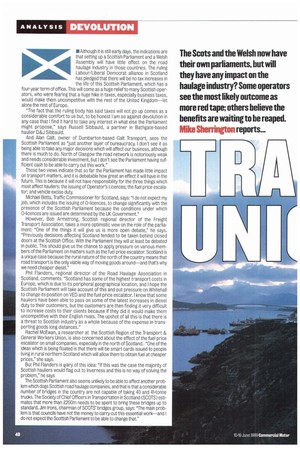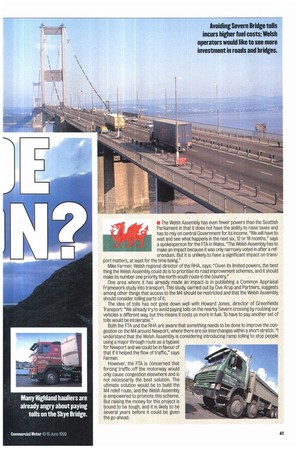The Scots and the Welsh now have their own parliaments,
Page 42

Page 43

If you've noticed an error in this article please click here to report it so we can fix it.
but will they have any impact on the haulage industry? Some operators see the most likely outcome as more red tape; others believe the benefits are waiting to be reaped. Mike Sherrington reports...
MAIthough it is still early days, the indications are that setting up a Scottish Parliament and a Welsh Assembly will have little effect on the road haulage industry in those countries. The ruling Labour/Liberal Democrat alliance in Scotland has pledged that there will be no tax increases in the life of this Scottish Parliament, which has a four-year term of office. This will come as a huge relief to many Scottish operators, who were fearing that a huge hike in taxes, especially business taxes, would make them uncompetitive with the rest of the United Kingdom—let alone the rest of Europe.
The fact that the ruling body has said taxes will not go up comes as a considerable comfort to us but, to be honest I am so against devolution in any case that I find it hard to take any interest in what else the Parliament might propose," says Russell Sibbauld, a partner in Bathgate-based haulier D84,J Sibbauld.
And Alan Galt, owner of Dumbarton-based Galt Transport, sees the Scottish Parliament as 'just another layer of bureaucracy. I don't see it as being able to take any major decisions which will affect our business, although there is much to do. North of Glasgow the road network is notoriously weak and needs considerable investment, but I don't see the Parliament having sufficient cash to be able to carry out this work."
These two views indicate that so far the Parliament has made little impact
',11111 on transport matters, and it is debatable how great an effect it will have in the future. This is because it will not have responsibility for the three things which most affect hauliers: the issuing of Operator's Licences; the fuel price escalator; and vehicle excise duty.
Michael Betts, Traffic Commissioner for Scotland, says: "I do not expect my job, which includes the issuing of 0-licences, to change significantly with the presence of the Scottish Parliament because the conditions under which 0-licences are issued are determined by the UK Government."
However, Bob Armstrong, Scottish regional director of the Freight Transport Association, takes a more optimistic view on the role of the parliament: "One of the things it will give us is more open debate," he says. "Previously decisions affecting Scotland tended to be taken behind closed doors at the Scottish Office. With the Parliament they will at least be debated in public. This should give us the chance to apply pressure on various members of the Parliament on matters such as the fuel price escalator. Scotland is a unique case because the rural nature of the north of the country means that road transport is the only viable way of moving goods around—and that's why we need cheaper diesel."
Phil Flanders, regional director of the Road Haulage Association in Scotland, comments: "Scotland has some of the highest transport costs in Europe, which is due to its peripheral geographical location, and I hope the Scottish Parliament will take account of this and put pressure on Whitehall to change its position on VED and the fuel price escalator. I know that some hauliers have been able to pass on some of the latest increases in diesel duty to their customers, but the customers are then finding it very difficult to increase costs to their clients because if they did it would make them uncompetitive with their English rivals. The upshot of all this is that there is a threat to Scottish industry as a whole because of the expense in transporting goods long distances."
Rachel McFwan, a researcher at the Scottish Region of the Transport 84, General Workers Union, is also concerned about the effect of the fuel price escalator on small companies, especially in the north of Scotland. "One of the ideas which is being floated is that there will be smart cards issued to people living in rural northern Scotland which will allow them to obtain fuel at cheaper prices," she says.
But Phil Flanders is wary of this idea: "If this was the case the majority of Scottish hauliers would flag out to Inverness and this is no way of solving the problem," he says The Scottish Parliament also seems unlikely to be able to affect another problem which dogs Scottish road haulage companies, and that is that a considerable number of bridges in the country are not capable of taking 40 and 41-tonne trucks. The Society of Chief Officers in Transportation in Scotland (SCOTS) estimates that more than £200m needs to be spent to bring these bridges up to standard. Jim Irons, chairman of SCOTS' bridges group, says: "The main problem is that councils have not the money to carry out this essential work—and I do not expect the Scottish Parliament to be able to change that."
a The Welsh Assembly has even fewer powers than the Scottish Parliament in that it does not have the ability to raise taxes and has to rely on central Government for its income. "We will have to wait and see what happens in the next six, 12 or 18 months," says a spokesperson for the FTA in Wales. "The Welsh Assembly has to make an impact because it was only narrowly voted in after a referendum. But it is unlikely to have a significant impact on transport matters, at least for the time being."
Mike Farmer, Welsh regional director of the RHA, says: "Given its limited powers, the best thing the Welsh Assembly could do is to prioritise its road improvement schemes, and it should make its number one priority the north-south route in the country."
One area where it has already made an impact is in publishing a Common Appraisal Framework study into transport. This study, carried out by Ove Arup and Partners, suggests among other things that access to the M4 should be restricted and that the Welsh Assembly should consider tolling parts of it.
The idea of tolls has not gone down well with Howard Jones, director of Greenfields Transport: "We already try to avoid paying tolls on the nearby Severn crossing by routeing our vehicles a different way, but this means it costs us more in fuel. To have to pay another set of tolls would be intolerable."
Both the ETA and the RHA are aware that something needs to be done to improve the congestion on the M4 around Newport, where there are six interchanges within a short stretch. "I understand that the Welsh Assembly is considering introducing ramp tolling to stop people using a major through route as a bypass for Newport and we could be in favour of
that if it helped the flow of traffic," says Farmer..
However, the ETA is concerned that forcing traffic off the motorway would only cause congestion elsewhere and is not necessarily the best solution. The ultimate solution would be to build the M4 relief route, and the Welsh Assembly is empowered to promote this scheme. But raising the money for this project is bound to be tough, and it is likely to be several years before it could be given the go-ahead.












































































































